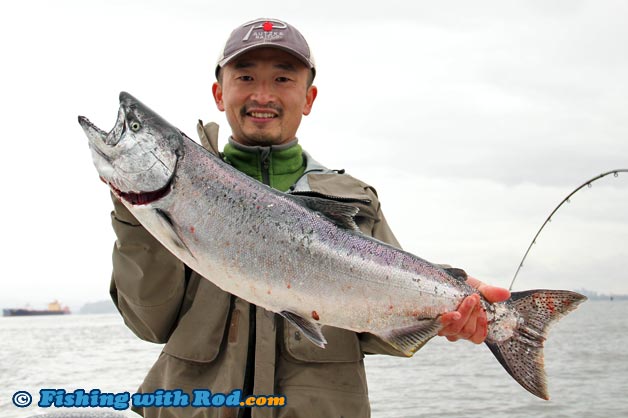Fishing in BC: Salmon in Saltwater
By Rodney Hsu, Fishing with Rod

British Columbia is most famous for its Pacific salmon fishing in both salt and freshwater. Although there is always some type of salmon fishing available throughout the year, the best months are between May and November.
From May to August, most salmon anglers focus on fishing in the ocean, from the West Coast of Vancouver Island to Queen Charlotte Island. Chinook salmon is the target species. During these months, schools of chinook salmon approach the shelves of the Eastern Pacific Ocean and feed on herring and other baitfish before travelling back to rivers. These chinook salmon, usually between 10 and 30lb, are at their prime so they are the hardest fighting salmon. It is recommended that you fish with a fishing guide, because looking for chinook salmon in the Pacific Ocean is like searching for a needle in the haystack. Saltwater fishing guides have the experience and know where these fish would be when feeding along the coast. By hiring a guide, you don't only save the expenses of owning and maintaining a boat, but you also save the time that you would have used to search for these feeding fish.
Two common techniques are used when targeting chinook salmon in the ocean. Fishing guides usually troll with herring, sardines, squid-like lures called hootchies and other artificial lures that resemble herrings. When fish are found, it is not unusual to see more than one chinook salmon hooked at a time, making things very exciting. The other traditional technique used is called mooching, which involves freely drifting a dead or live herring beneath the boat. Many anglers prefer to use this technique because it is exciting to watch the taps on the rod tip before a chinook salmon fully committed to the bait.
Sockeye salmon are usually targeted by fishermen in July and August when they are just outside the river mouth. Like chinook salmon, they are also caught by trolling, except with lighter fishing tackle. These silver salmon often run and jump when hooked, making things quite chaotic on the boat at times especially if several fish are hooked at once.
As August approaches, saltwater fishermen begin concentrating their effort closer to the beach, where pink and coho salmon gather. Unlike chinook salmon, coho and pink salmon tend to feed closer to the surface and closer to kelp beds. They hunt for smaller baitfish such as needlefish that live among kelps. Fishermen target these species by either casting spoons or saltwater flies. These fish can simply be caught by wading from a beach, but a boat gives anglers the advantage to move to a school of fish very quickly when it is sighted. The bite can usually be seen near the surface, making this a very visual and exciting fishery. This type of beach fishing is practiced from August to October.
October and November are also two great months for trolling if you are willing to brave the cold weather. Although by this time chinook salmon are already in rivers, chum salmon are staging in bays and inlets. The same technique used on chinook salmon can also be used for chum salmon. While these fish are usually not considered as the best eating fish in rivers, silver chum salmon in the ocean are both incredibly strong and delicious.
Although salmon fishing in the ocean can be done during the winter months, success rate is generally very low and majority of the catches are undersized feeders. Combining with the rough winter weather condition, the only fishermen who do this are experienced locals who don't mind braving the cold weather. That being said, the fishing between February and April can sometimes be amazing, in in-shore waters such as Vancouver Harbour. From Downtown Vancouver and Victoria, where the winter weather can be exceptionally mild at times, a good day of chinook salmon fishing from a boat in nearby waters is very common.
To take part in British Columbia's saltwater salmon fisheries, you need to have a valid saltwater fishing licence. You also need to purchase a salmon conservation stamp if you wish to retain your catches. The saltwater salmon fishing regulations change seasonally and vary between locations, so you should be familiar with them prior to each trip.

